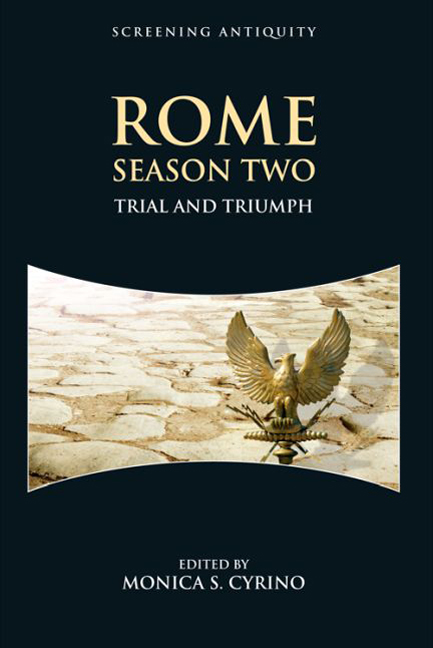Book contents
- Frontmatter
- Contents
- Series Editors’ Preface
- Editor's Acknowledgments
- Contributors
- List of Illustrations
- Episode Listing
- Cast List
- Introduction: The Trials and Triumphs of Rome, Season Two
- PART I POWER AND POLITICS
- 1 A Touch Too Cerebral: Eulogizing Caesar in Rome
- 2 Discharging Pullo and Vorenus: Veterans in Rome
- 3 Gangsterism in Rome
- 4 Class, Chaos, and Control in Rome
- 5 Earning Immortality: Cicero's Death Scene in Rome
- 6 The Triumvirate of the Ring in Rome
- 7 Jews and Judaism in Rome
- PART II Sex and Status
- Filmography
- Bibliography
- Index
5 - Earning Immortality: Cicero's Death Scene in Rome
from PART I - POWER AND POLITICS
Published online by Cambridge University Press: 07 October 2017
- Frontmatter
- Contents
- Series Editors’ Preface
- Editor's Acknowledgments
- Contributors
- List of Illustrations
- Episode Listing
- Cast List
- Introduction: The Trials and Triumphs of Rome, Season Two
- PART I POWER AND POLITICS
- 1 A Touch Too Cerebral: Eulogizing Caesar in Rome
- 2 Discharging Pullo and Vorenus: Veterans in Rome
- 3 Gangsterism in Rome
- 4 Class, Chaos, and Control in Rome
- 5 Earning Immortality: Cicero's Death Scene in Rome
- 6 The Triumvirate of the Ring in Rome
- 7 Jews and Judaism in Rome
- PART II Sex and Status
- Filmography
- Bibliography
- Index
Summary
Rome's fictional depiction of Cicero's death (episode 18, “Philippi”) was one of the most awaited scenes in the second season, yet one that variously surprised some viewers. It was greatly anticipated, as the death of Marcus Tullius Cicero on December 7, 43 bc is one of the best-known pictures of the late Roman Republic, and one of the most detailed among such descriptions in antiquity, which did not lack its share of morbid portrayals. It would be interesting to explore the modern adaptation against the facts we already know of Cicero's death. But what exactly do we know? Not much, it would seem. As succinctly put by Andrew Wright, the paradox is frustrating:
The route of Cicero's flight from Rome, the precise manner of his death, the identity of his killer(s), the reception accorded Cicero's head and hand(s) in Rome, as well as the numerous other details attested in the historical material must remain in doubt. We are faced with the ultimate irony: that despite having a range of source material on this event which is, relatively speaking, extremely wide, we know very little indeed about what actually happened.
Thus, from the outset, Cicero's death is obscured by clouds of fiction. Our tradition of the famous scene stems from several strands. One is historical, and found in the extant history books of Appian (Civil War.19–20), Cassius Dio (47.8.3–4, 11.1–2), Livy (Summary 120), Florus (2.16.5), the anecdotal collection of Valerius Maximus (1.4.6, 5.3.4), as well as in Plutarch's biographies of Cicero (47–9) and Antony (20).4 The other tradition comes from the rhetorical schools, and is evidenced mainly in Seneca the Elder's Suasoriae (6–7) and Controversiae (7.2). The episode attracted orators in particular and was deemed a suitable topic for what were called declamations (declamationes), exercises used in rhetorical training. In the schools, they included suasoriae (fictitious historical speeches) or controversiae (fictitious legal orations). The first were related to the deliberative variant of persuasion in political cases, based on historical or legendary situations; the second dealt with the forensic variant of oratory, addressing legal questions.
- Type
- Chapter
- Information
- Rome Season TwoTrial and Triumph, pp. 61 - 73Publisher: Edinburgh University PressPrint publication year: 2015



